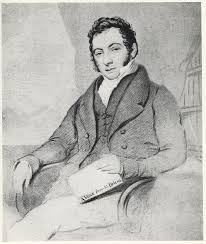Barry O'Meara
Barry Edward O'Meara (1786–1836) was an Irish surgeon who is best known for his role as Napoleon Bonaparte's personal physician during the latter's exile on Saint Helena following his abdication in 1815. O'Meara's writings, particularly his book "Napoleon in Exile; or, A Voice from St. Helena" (1822), provide a detailed account of Napoleon's final years and have been valuable sources for historians.
Early Life and Career[edit | edit source]
Barry Edward O'Meara was born in 1786 in Dublin, Ireland. Little is known about his early life before he entered the medical profession. O'Meara studied medicine and, upon completing his education, joined the British Royal Navy as a surgeon. His naval career included participation in several significant battles during the Napoleonic Wars, which eventually led to his assignment to Saint Helena.
Exile with Napoleon[edit | edit source]
After Napoleon Bonaparte's defeat at the Battle of Waterloo in 1815 and subsequent abdication, the British government exiled him to the remote island of Saint Helena in the South Atlantic Ocean. O'Meara, having previously treated Napoleon for a temporary illness, was selected by Napoleon himself to serve as his personal physician during his exile.
During his time on Saint Helena, O'Meara formed a close relationship with Napoleon, gaining his trust and confidence. O'Meara's unique position allowed him to document detailed observations of Napoleon's health, daily life, and personal reflections. However, his close association with Napoleon and his criticism of the harsh conditions imposed by the British governor, Hudson Lowe, led to tension and eventual conflict.
Later Life and Works[edit | edit source]
O'Meara was removed from Saint Helena in 1818 due to his disputes with Governor Lowe and returned to London, where he became embroiled in the public debate over Napoleon's treatment. In 1822, he published "Napoleon in Exile; or, A Voice from St. Helena," which criticized Lowe's administration and provided a sympathetic portrayal of Napoleon. The book was a commercial success and contributed to the shaping of public opinion regarding Napoleon's final years.
Despite the controversy surrounding his relationship with Napoleon and his subsequent career, O'Meara's writings remain an important primary source for historians studying the Napoleonic era. His detailed accounts have provided insights into Napoleon's character, health issues, and the conditions of his exile.
O'Meara died in 1836 in London. His legacy continues through his contributions to Napoleonic literature and the unique perspective he provided on one of history's most iconic figures.
Legacy[edit | edit source]
Barry O'Meara's work has been scrutinized and debated by historians, but his firsthand accounts offer invaluable insights into the daily life and personality of one of the most studied figures in history. His portrayal of Napoleon has influenced both historical scholarship and popular perceptions of the Emperor in exile.
Search WikiMD
Ad.Tired of being Overweight? Try W8MD's physician weight loss program.
Semaglutide (Ozempic / Wegovy and Tirzepatide (Mounjaro / Zepbound) available.
Advertise on WikiMD
|
WikiMD's Wellness Encyclopedia |
| Let Food Be Thy Medicine Medicine Thy Food - Hippocrates |
Translate this page: - East Asian
中文,
日本,
한국어,
South Asian
हिन्दी,
தமிழ்,
తెలుగు,
Urdu,
ಕನ್ನಡ,
Southeast Asian
Indonesian,
Vietnamese,
Thai,
မြန်မာဘာသာ,
বাংলা
European
español,
Deutsch,
français,
Greek,
português do Brasil,
polski,
română,
русский,
Nederlands,
norsk,
svenska,
suomi,
Italian
Middle Eastern & African
عربى,
Turkish,
Persian,
Hebrew,
Afrikaans,
isiZulu,
Kiswahili,
Other
Bulgarian,
Hungarian,
Czech,
Swedish,
മലയാളം,
मराठी,
ਪੰਜਾਬੀ,
ગુજરાતી,
Portuguese,
Ukrainian
Medical Disclaimer: WikiMD is not a substitute for professional medical advice. The information on WikiMD is provided as an information resource only, may be incorrect, outdated or misleading, and is not to be used or relied on for any diagnostic or treatment purposes. Please consult your health care provider before making any healthcare decisions or for guidance about a specific medical condition. WikiMD expressly disclaims responsibility, and shall have no liability, for any damages, loss, injury, or liability whatsoever suffered as a result of your reliance on the information contained in this site. By visiting this site you agree to the foregoing terms and conditions, which may from time to time be changed or supplemented by WikiMD. If you do not agree to the foregoing terms and conditions, you should not enter or use this site. See full disclaimer.
Credits:Most images are courtesy of Wikimedia commons, and templates Wikipedia, licensed under CC BY SA or similar.
Contributors: Prab R. Tumpati, MD

